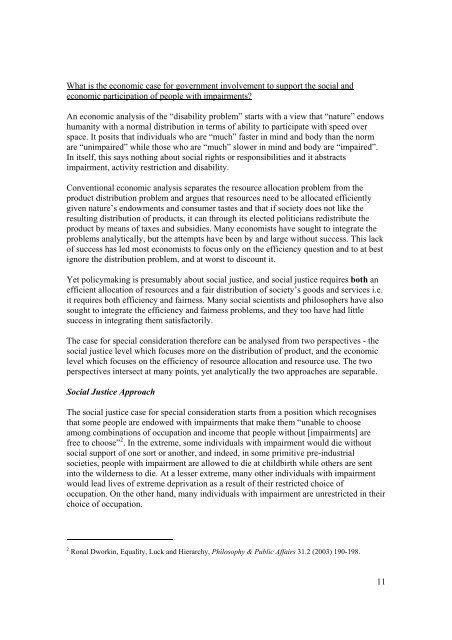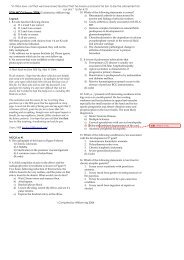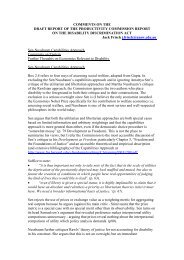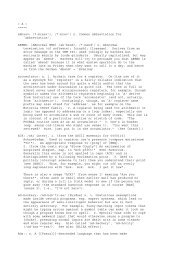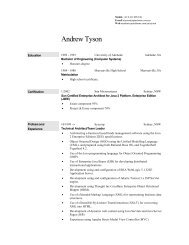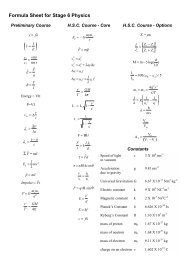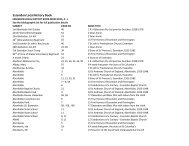Notes to Submission to the Productivity Commission Inquiry into the ...
Notes to Submission to the Productivity Commission Inquiry into the ...
Notes to Submission to the Productivity Commission Inquiry into the ...
Create successful ePaper yourself
Turn your PDF publications into a flip-book with our unique Google optimized e-Paper software.
What is <strong>the</strong> economic case for government involvement <strong>to</strong> support <strong>the</strong> social andeconomic participation of people with impairments?An economic analysis of <strong>the</strong> “disability problem” starts with a view that “nature” endowshumanity with a normal distribution in terms of ability <strong>to</strong> participate with speed overspace. It posits that individuals who are “much” faster in mind and body than <strong>the</strong> normare “unimpaired” while those who are “much” slower in mind and body are “impaired”.In itself, this says nothing about social rights or responsibilities and it abstractsimpairment, activity restriction and disability.Conventional economic analysis separates <strong>the</strong> resource allocation problem from <strong>the</strong>product distribution problem and argues that resources need <strong>to</strong> be allocated efficientlygiven nature’s endowments and consumer tastes and that if society does not like <strong>the</strong>resulting distribution of products, it can through its elected politicians redistribute <strong>the</strong>product by means of taxes and subsidies. Many economists have sought <strong>to</strong> integrate <strong>the</strong>problems analytically, but <strong>the</strong> attempts have been by and large without success. This lackof success has led most economists <strong>to</strong> focus only on <strong>the</strong> efficiency question and <strong>to</strong> at bestignore <strong>the</strong> distribution problem, and at worst <strong>to</strong> discount it.Yet policymaking is presumably about social justice, and social justice requires both anefficient allocation of resources and a fair distribution of society’s goods and services i.e.it requires both efficiency and fairness. Many social scientists and philosophers have alsosought <strong>to</strong> integrate <strong>the</strong> efficiency and fairness problems, and <strong>the</strong>y <strong>to</strong>o have had littlesuccess in integrating <strong>the</strong>m satisfac<strong>to</strong>rily.The case for special consideration <strong>the</strong>refore can be analysed from two perspectives - <strong>the</strong>social justice level which focuses more on <strong>the</strong> distribution of product, and <strong>the</strong> economiclevel which focuses on <strong>the</strong> efficiency of resource allocation and resource use. The twoperspectives intersect at many points, yet analytically <strong>the</strong> two approaches are separable.Social Justice ApproachThe social justice case for special consideration starts from a position which recognisesthat some people are endowed with impairments that make <strong>the</strong>m “unable <strong>to</strong> chooseamong combinations of occupation and income that people without [impairments] arefree <strong>to</strong> choose” 2 . In <strong>the</strong> extreme, some individuals with impairment would die withoutsocial support of one sort or ano<strong>the</strong>r, and indeed, in some primitive pre-industrialsocieties, people with impairment are allowed <strong>to</strong> die at childbirth while o<strong>the</strong>rs are sentin<strong>to</strong> <strong>the</strong> wilderness <strong>to</strong> die. At a lesser extreme, many o<strong>the</strong>r individuals with impairmentwould lead lives of extreme deprivation as a result of <strong>the</strong>ir restricted choice ofoccupation. On <strong>the</strong> o<strong>the</strong>r hand, many individuals with impairment are unrestricted in <strong>the</strong>irchoice of occupation.2 Ronal Dworkin, Equality, Luck and Hierarchy, Philosophy & Public Affairs 31.2 (2003) 190-198.11


